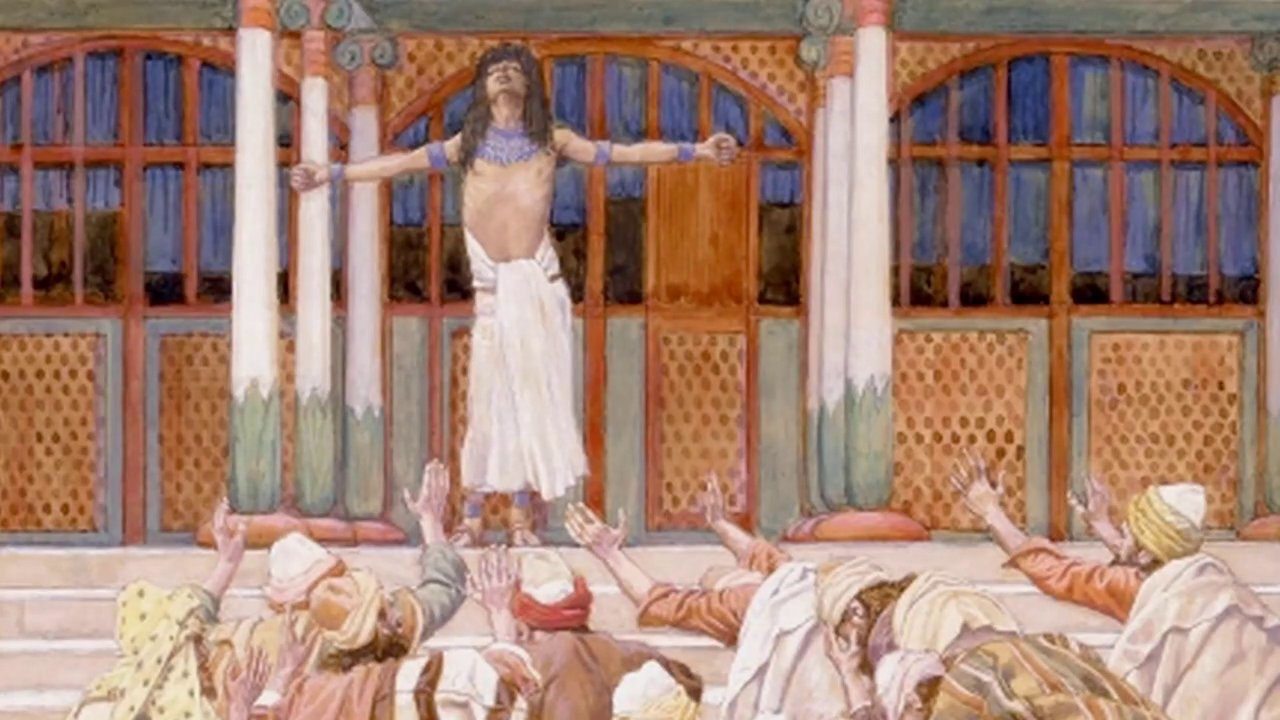 By Christine Darg
By Christine Darg
Jerusalem Channel
Joseph said, “I am seeking my brothers” in this week’s Torah portion in Genesis 37: 16.
The portion is extremely prophetic because Joseph in the Hebrew Bible is a type of Messiah and today in these Last Days Jesus/Yeshua is indeed seeking his brethren. He has been hidden from them for nearly two millennia. The Jewish people think of Jesus as a gentile god, just as Joseph was disguised as a gentile in the role of Egyp’s governor. But the day came in God’s Providence when Joseph—i.e. Zaphenath-Paneah, “the Saviour of the world”— revealed his true identity to his brethren, the sons of Jacob, “I am Joseph thy brother!” And they wept at their poignant reconciliation.
Prophecy watchers anticipate with great expectations that Jesus will be welcomed back to Israel in the future, and it will take a religious awakening for this to happen. It won’t be secular people who will summons Jesus with, “Baruch Haba, blessed is he who comes in the name of the Lord.” That kind of talk belongs to religious Jews. Today many religious Jews, even secular ones, have an expectancy that Messiah is coming soon! Many Jews believe they must be proactive in ushering in the Messianic age.
Jewish tradition sometimes refers to two Messiahs. Some regard this concept as a rabbinic invention but others acknowledge that there are definitely two portraits of Messiah in the Hebrew Scriptures and that Jesus of Nazareth fulfils both types—the suffering messiah and the triumphant ruling king messiah.
According to Jewish eschatology, both redeemers—Messiah son of Joseph and Messiah son of David– will be involved in delivering the Jewish people from exile in order to usher in the long-awaited messianic era—a time period that Christians call the Millennium.
However, when speaking of the Messiah, the Jewish people generally have in mind the son of David who will rule the messianic age.
I believe the patriarch Joseph is kept in the news because he is also a type and an idiom of the Messiah himself
Among Israelis who are religiously obsevant, followers of the Breslov movement are infused with a great deal of Biblical faith. Rabbi Nachman of Breslov, in the Ukraine, was a great-grandson of the famous Baal Shem Tov, founder of Hasidic Judaism, in Eastern Europe. Rabbi Nachman’s Breslev branch of Hasidic Judaism has three core tenets: namely, pouring out one’s heart to God in a form of meditation, usually performed outdoors in a secluded and natural spot; Rabbi Nachman taught that his followers should spend an hour each day alone, talking aloud to God, as if “talking to a good friend,” in addition to the Jewish prayer book. A second tenet, Tikkun Ha’Brit, concerns maintaining sexual purity, and a third tennet is a deep attachment to the tzaddikim (men considered to be exceptionally righteous).
All of those traits were personified in the biblical patriarch Joseph, the son of Jacob and Rachel. When we think of the biblical patriarchs, of course the first who come to mind are Abraham, the father of faith; Isaac, his son of promise; and Jacob, the father of the twelve tribes of Israel. Yet concerning Jacob’s son, Joseph, more space is devoted in Genesis to him than to the other patriarchs; and if you search the scriptures, you’ll find that there’s not a single word of reproof against Joseph except his family’s rebuke of his God-given dreams. When he was cruelly sold into slavery by his jealous brothers, Joseph chose to go to prison in Egypt rather than sin sexually with his master’s wife.
His sterling character is worthy of careful study…His nobility of character, his purity of heart and life; His greatness as a ruler and faithful brother all add up to being an illustration of the coming Messiah more than any other character in the Hebrew Scriptures. Before he died in Egypt, Joseph requested that his bones be brought up from Egypt to the promised land, and according to Joshua 24: 32, Joseph was buried at Shechem, in the ground his father Jacob had purchased.
Joseph’s Tomb is located at the eastern entrance to the valley that separates the biblical mountains of blessings and cursings, Mounts Gerizim and Ebal; the tomb is located only 300 metres from Jacob’s Well, on the outskirts of the Palestinian city of Nablus. I’ve visited Jacob’s Well many times, but so far I’ve only been to Joseph’s Tomb once because it’s located in a highly contested corridor.
The sages teach that Joseph’s request to be buried in the promised land was providential. In Genesis chapter 50, Joseph said to his brothers in Egypt, “I’m about to die. God will surely take notice of you and bring you up from this land to the land that He promised on oath to Abraham, Isaac, and Jacob.” So Joseph made the sons of Israel promise to carry up his bones from Egypt. Joseph could have requested to be buried in the Promised Land immediately after his death, as his father Jacob had been. In fact, there had been a long entourage from Egypt to Hebron just to bury Jacob. All Pharaoh’s officials and dignitaries accompanied the members of Joseph’s household and his brothers. Chariots and horsemen also went up with a very large company.
But Joseph prophetically insisted that they should bring out his bones only when the Israelite nation made their Exodus from Egypt to the Promised Land. Meanwhile, according to the Bible, Joseph was embalmed and buried in a coffin in Egypt. A later midrash identified his first tomb as a royal mausoleum.
Moses gathered Joseph’s bones and took his coffin during the Exodus, and this account was repeated by the Jewish historian Josephus, who specified that Joseph’s bones were buried in Canaan, the land of Israel.
Today Joseph’s Tomb is a constant source of conflict.
We Christians may wonder…..Why do religious Jews pray at a tomb? Many of the modern Jewish zealots believe they have to be proactive in bringing the Messiah. These holy places are a point of contact, they believe, with God. They quote Zechariah 1:3 as a biblical mandate, in which God says, “Turn back to me — and I will turn back to you.”
Many Israelis—not all—but many today believe that there are certain steps that will bring about the Messiah’s appearing: first there must be a physical return of the Jewish people to the Land of Israel, then the building of the Third Temple, and also the return of the Davidic Dynasty. Some believe that only the Messiah himself can restore the temple. But others are proactive, doing what they can to make it happen, even if it puts them in harm’s way.
Furthermore, God is keeping the Hebrew patriarch Joseph in the news because, he IS a type of the Messiah. In fact, there are more than 100 parallels between the lives of Joseph, son of Jacob, and Jesus, Yeshua, son of David. Just as Joseph was hated, envied, rejected by his brethren and sold for pieces of silver, so Jesus was envied, hated, rejected and betrayed for pieces of silver. The parallels are amazing. In due time, both Joseph and Jesus were vindicated and exalted by God, but no parallel is as poignant as the tears of Joseph and the tears of Jesus.
In Genesis 43:30, after a separation of 20 years, Joseph was “deeply moved at the sight of his younger brother Benjamin because they shared the same mother, Rachel. Joseph escaped to look for a private room to weep. And when Joseph finally revealed himself to his brethren after 20 years of separation, Genesis 45: 2 also records, “Joseph wept so loudly that the Egyptians and the house of Pharaoh heard it.”
In the Gospel accounts, Jesus’ tears over Jerusalem and the fate of his people remind us of Joseph’s tears over his estranged Israelite family: Luke 19: 42 records that as Jesus approached Jerusalem and saw the city ahead, he began to weep over it, saying, “If you, even you, had only known on this day what would bring you peace–but now it is hidden from your eyes.”
Someday soon, like Joseph, Jesus will reveal himself to his brethren, the Jewish people, and there will be much weeping but also reconciliation. Joseph forgave his brothers for betraying him because he was able to see the big picture. Joseph perceived God’s wonderful providence in using his exaltation to power in Egypt to save his family during a time of famine. Jesus also forgave his tormentors because he was able to see the big picture of being the saviour of Israel and the world.
Before they were reconciled, first Joseph had the extraordinary patience to test his brothers. The Bible commentaries observe the severity of the love of Joseph. In the providence of God, Joseph didn’t allow his personal feelings to interfere with his duty to his family and to Bible prophecy. Joseph’s brotherly love was noble. God’s love to us is still nobler, but severity often accompanies it. He disciplines us for our own good. Just as Joseph’s brothers deserved to be tested and disciplined, the Lord tests us and subjects us to trials and tribulations in order to bring us prostrate before Him to acknowledge our sin just as Joseph’s brothers were brought to a similar position. Through various tests mentioned in the Book of Genesis, Joseph was able to discover that his brothers were repentant for having sold him as a slave and that they were truly sympathetic to their elderly father’s feelings. Even though he was the governor and potentate of the land, Joseph was free to say to his brothers, ‘Come close to me.’ When they came close, he revealed, ‘I am your brother Joseph, the one you sold into Egypt!’ How gracious! Joseph didn’t say I am your brother who you sold as a salve, but who you sold into Egypt—you sold me into my destiny, in other words. “But don’t be angry with yourselves for selling me here, because it was to save your lives that God sent me ahead of you.” You meant it for evil, but God meant it for good.
I want you to consider with me that Jesus also calls us to come close to him – He wants us to receive him as our Brother and Saviour. He comforts us and tells us not to be angry with ourselves for our sins and mistakes, but like Joseph’s repentant brothers, we should rejoice that Jesus offers us pardon and deliverance! Just as God sent his favored son Joseph to Egypt to save Jacob’s family, so God sent his only begotten Son into this world to save all of us—to save those who will believe on the son of God! Joseph’s brothers were looking for food, but God knew they also needed reconciliation. Joseph invited them, “Come near.” Jesus also invites each and every one of us to come to Him. When we acknowledge our sin, the Lord embraces us as Joseph embraced his brethren and extends forgiveness to us. Joseph was his brothers’ judge, but he revealed himself to them privately, covering their sin. Jesus invites you to come to Him now, and He covers our sin by His Blood.
Genesis 42:8 is a wonderfully prophetic verse:
“And Joseph knew his brothers, but they knew him not.” This speaks volumes because Jesus knows and deeply loves his brethren but at present they don’t know him.
Joseph’s childhood dreams that got him into so much disfavour with his jealous brothers were fulfilled. In Genesis 42: 6, “Joseph’s brethren bowed down before him with their faces to the ground.” When Joseph had first told them of his dreams, they mocked him and scoffed, saying — “Shall you then indeed reign over us, or shall you have dominion over us?” But the Bible commentaries teaches that Joseph knew in the foreordination of God that he was put in the position of lord over his brethren, and so he felt duty bound to use his authority for their moral good. How was Joseph instantly able to recognize his brothers? All ten of them were full grown men when he’d last seen them on that fateful day in Dothan; he was quite familiar with their appearances, and he understood their mother tongue. The Biblical record says, “And he made himself strange unto them.” But “They knew not him.” Why didn’t Joseph’s brothers have a clue about him? Actually, when you add up the reasons, it isn’t so strange. Joseph had changed in appearance much more than they had changed. When they tragically sold Joseph into slavery, they were already full-grown men—he was but a youth at their parting. They appeared before him in their usual dusty garb—but Joseph was wearing his official elegant attire. They never dreamt of Joseph as governor of Egypt, clothed before them as a prince; and besides, he spoke the Egyptian language; and had acquired Egyptian manners. He stood before them in such power, spendor, grandeur and authority, and with such an entourage attending him, that they never once thought of their little half brother Joseph, whom they supposed was dead by now. At first Joseph treated them roughly, but his stern manner wasn’t revenge, it was his intention to bring them to repentance. God, in his providence, sometimes seems harsh to those he loves.
Today it’s so hard for the Jewish people to recognize Jesus because he’s been made to look like a gentile by the church. The church has dressed Jesus in Gentile idioms yet even after his resurrection and ascension to heaven, Jesus himself describes himself in the Book of Revelation, the last book in the New Testament, as the lion of the tribe of Judah and as the root and offspring of King David. He’s the same today; he hasn’t changed. That’s one reason why the recovery of Jesus’s Hebrew roots is important. Some day soon the Jewish people will receive Jesus back into the fold. As we see anti-Semitism increasing exponentially, it’s surely an end-time sign. My prayer is from Psalm 25,
“Deliver Israel, O God, out of all his troubles.” And that deliverance will come ultimately when Jesus returns.







Very clearly explained to see the whole picture of Scripture of Joseph and Jesus’s role!! Thank you for sharing !!!!! You make the Word easier to grasp!!!!!!
Thank you from Christine!